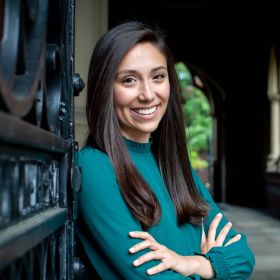People
Aurora Turek
Aurora Turek
“My cohort is very close; we take classes together, discuss research ideas, and really support each other.”
As an undergraduate in psychology at the University of Michigan, Aurora Turek (she/her) became interested in the ways that psychology can be applied to the workplace. This interest led her to a research assistantship at the Ross Behavioral Lab, where she worked together with graduate students in psychology and was introduced to the field of Organizational Behavior. As a rising senior, she served as a summer research assistant at Columbia Business School and went on to accept a full time research position there after graduation. “This was a great chance to gain some exposure, to work one-on-one with a faculty member, and to be sure I wanted to apply to doctoral programs,” she explains.
Upon arriving at HBS, Aurora was thrilled to become part of such a supportive community. “I had heard that graduate school could be isolating,” Aurora remembers. “But my cohort is very close; we take classes together, discuss research ideas, and really support each other.” She credits the Doctoral Programs office with providing opportunities for HBS doctoral students to get to know each other and connecting incoming students with older cohorts for advice and direction.
So far, Aurora has found that the qualities that make a student successful at HBS are the same ones that will help them in their career later on: curiosity, self-motivation, and diligence. “Being truly interested in the questions that you are pursuing will keep you motivated—as a graduate student and throughout your career,” she explains. As she looks to the future, she envisions herself staying in academia in the context of a business school. “At HBS, we get so much career support, even during our first year,” Aurora says. Recently, she and her cohort heard from OB students who have begun applying for academic positions to learn about their experience and what to expect.
Research
Aurora’s research interests center around the ways that workplace dynamics are shaped by gender and power. She is examining how women express disagreement in the workplace—particularly when it comes to innovation, where productive disagreement plays a crucial role. Aurora is also helping to organize a lab at the Behavioral Insights Group at the Harvard Kennedy School, where undergraduate research assistants will have the opportunity to work closely with faculty members.

